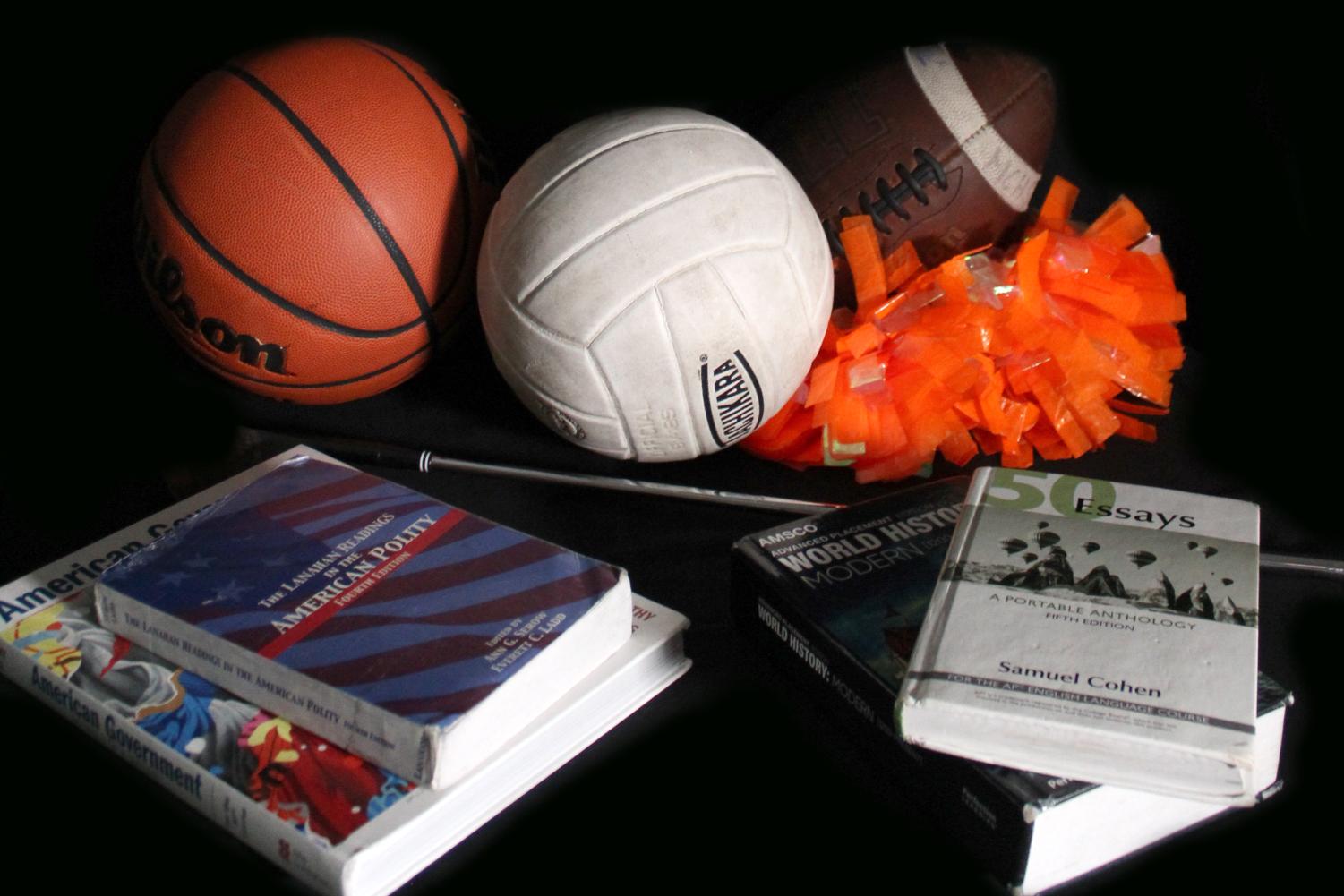It’s a hot, sweaty, bumpy bus ride home after the game. The bus is silent, everyone reflecting on how the game ended. Another defeat after best efforts, but the pressure collapsed the team once again. Practice is going to be miserable.
However, there is so much more to do before practice tomorrow. After getting home, there are easily two hours of homework and studying. Every assignment and assessment matters to keep grades the same.
Being a student athlete comes with a very busy schedule to balance.
“A lot of the days, I got straight from high school basketball right to club volleyball practice,” explained Lynette Alsot, a senior basketball and volleyball captain. “Some days I leave the house at 7 and do not get home until 10:15. It is just a constant, I do this everyday over and over, but it is worth it I think. However, not being home to have time to do school work, my mind is always like, ‘What is next?’ What does my schedule look like later in the day.”
During the high school seasons, every sport experiences late night games, which can make it difficult for students.
“Especially game days because after school we have like an hour to get ready,” described Madalynn Friedle, a senior varsity girls basketball captain. “So you go home, change and then you come back and then you don’t get home till nine. Then by the time you shower and all that you have no motivation to do homework — at least I don’t.”
Having little to no time after school to accomplish school work can lead to late nights, which add up and have a major effect on student athletes.
“I feel extremely drained,” stated Alsot. “Some days I’m constantly just looking for a break, even though I probably should be thinking it’s more of an opportunity, but sometimes it’s just so mentally and physically draining. It’s hard to function, especially late nights and really early mornings.”
This draining, extensive schedule, can affect a students grades as well if they are not careful. However, as student athletes it is very important to keep their grades high, which can heavily pressure a student into these late nights. Students have to maintain passing grades in order to be eligible for high school sports — generally five courses, according to the IHSA.
While students are required to maintain passing grades, most students are expected to earn better grades. This pressure can come from themselves, teachers, or parents.
“
Some days I’m constantly just looking for a break, even though I probably should be thinking it’s more of an opportunity, but sometimes it’s just so mentally and physically draining. It’s hard to function, especially late nights and really early mornings.
— Lynette Alsot
“I’m pretty good about keeping my grades up just because my family’s very strict about grades,” explained Mia Filipiak, a sophomore on the JV track and tennis teams. “I find it hard to balance school and track and then of course just like overall living. I don’t think I’ve ever gotten eight hours of sleep at night because I’m up doing homework.”
In order to stay afloat, student athletes must manage their time well in order to succeed in school and work to prevent these late nights.
“I try to manage like during study hall and like so I have a lot of free periods. So during the free periods, I get all my homework done,” Madison Donovan, a junior varsity golfer, says. “So, usually, it’s not that hard for me, but I know for all the other girls on our team, it can be a little bit of struggle.”
For some students this is possible, but for others there simply is not enough time to manage.
“I have to be really diligent and work really hard throughout the school day to get all my work done, so I am not really doing it to the best of my ability,” explained Alsot. “I am just doing it to get done, even though I really want to put my best potential into everything I do but sometimes the time does not allow for that.”
Every student’s situation is unique, which is important for teachers to understand when working with students and student athletes.
“I think there’s some teachers that understand,” explained Dominick Caruso, a senior who plays football, bowling, and lacrosse, “but there’s some that don’t understand how it’s different for every student. Every student has a different backstory. They have to understand that maybe this assignment isn’t on time because of a certain reason or maybe they didn’t perform well on this test because they have stuff going on. As students we have lives too. It’s not just like we can come to school. And be the same person every day.”
Certain teams in the school study together in order to ease the pressure of exceeding in school and a sport.
“We hold study tables and during finals,” described Chris Madson, the boys basketball coach. “We do review tables. We take time before practice and we do it as a basketball team. That kind of just helps reinforce that we’re connected and we want the same things for them that their teachers do. That whole kind of 360 approach.”
When time is taken as a team to work together to further their education, it can help the team focus on the sport since their mind will not be elsewhere during game time.
“If your athletes are so worried about having multiple projects and tasks. Their mind is somewhere else, you are not gonna get that much done in practice anyways,” explained Sean Sterner, the girls golf head coach. “So taking the time to do both can be essential. It’s about making sure you’re taking care of your business outside of school, not just for yourself, but also for the success of your team.”
As well as pressure to exceed in school, there is a pressure to excel in athletics. This pressure can result from coaches and teammates wanting their team to do well.
“I just know that there’s an expectation,” explained Elijah Nothdorf, a senior varsity football captain, “and if you don’t meet that expectation you could get replaced or there’s other kids who are fighting to take your spot, so you have to perform well and meet their expectations to keep you in spot. I know I need to perform on the field. I know my coach and my teammates expect me to do well, so I feel a lot of pressure.”
Before games is when athletes most often feel the pressure is at its highest, often coming from themselves.
“I personally hold myself to a really high expectation and I really want to do the best I can on the court for both sports especially when they are going at the same time,” described Alsot.
To deal with the pressure the athletes feel, everyone prepares themselves for the games differently.
“I just get myself locked in,” explained Caruso. “I listen to music beforehand, and then I keep everything to myself. I don’t talk to a lot of people before the game, I just really lock in with myself and focus on my goal and what I’m trying to achieve at the game.”
“
I just know that there’s an expectation, and if you don’t meet that expectation, you could get replaced, or there’s other kids who are fighting to take your spot, so you have to perform well and meet their expectations to keep you in spot.
— Elijah Nothdorf,
While in the game, it can become stressful on the athletes. Everyone also has their own unique approach to coping with this too.
“I’ve just tried to ignore the coaches and just focus on myself,” described Friedle. “I’m not even gonna lie — I take it out like a little bit on the game. You’ll see me get mad. If something bad happens, I get mad at me.”
After games, teams and individuals take away what they need to improve for the next game. This is sometimes one of the ways athletes deal with the pressure put upon them.
“I really just deal with that pressure by going back at it in practice, and making sure that I do those things right more in practice and spend more time on those that way in the game,” explained Quentin Kinshofer, a football player. “I know even if I mess it up, I try to prepare myself better.”
Many coaches push their athletes during practice in order to prepare them for games, which should alleviate some of the pressure during and before games.
“If we are preparing effectively and we are working hard and practice, if we are doing what we need to do on a daily basis, we don’t have to put any extra pressure on ourselves,” stated Sterner. “Actually, the opposite. We should put less pressure on ourselves because we know we prepared really well.”
Coaches often find that their athletes stress over factors of the game, however, many factors of a game or match are out of their control.
“We often like saying control what you can control,” Madson said. “We have lessons along the way where we are trying to get student athletes to understand that we can not have control over everything.”
Since not everything can be within the student athletes control, pressure will always exist in some form for them.
“I like that there’s pressure otherwise everyone would do it,” Madson added, “trying to get our athletes to have that kind of mental skill of identifying pressure and realizing how to use it positively and solve for it, if it is becoming anxiety or stress or whatever it might be. But pressure is good, so we just tried to provide support for them.”
For every student athlete, pressure exists. This comes in many forms, athletic or academic, and from many different sources. Everyone has a different situation, which is important for family, friends, coaches and teachers to remember. Student athletes often require support, and it is important that they gain this in order for the pressure to not become overwhelming.
Life is very busy as a student athlete, but it is important to maintain balance between school and sports through time management to be successful at both.

